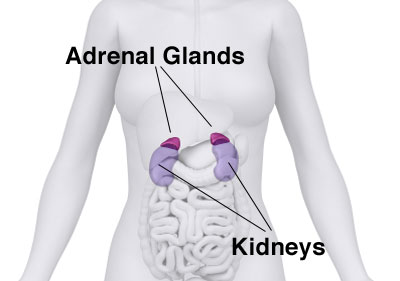Adrenal tumors are benign (non-cancerous) or malignant (cancerous) growths in the adrenal glands. Their presence is known because of certain signs and symptoms, although there are instances when they are not around. Excessive amounts of steroid hormones in the blood such as cortisol are telltale signs too because they are secreted by the tumors themselves.
Adrenal Gland Facts
Every person has a pair of adrenal glands. There’s one adrenal gland sitting on the top of each of your kidneys. The role of these glands is to secret hormones.
Your adrenal glands are made up of 2 parts, each one of them functioning separately. The outer part is the adrenal cortex. This particular part is responsible for the production of 3 hormones. They are cortiosol, aldosterone and dehydroepiandrosterone or DHEA. These hormones are role players in the metabolism as well as your physical features.
Inside the cortex is the adrenal medulla. This part of the adrenal gland also produces and secretes 3 hormones. They are dopamine, epinephrine and norepinephrine. All of them control your body’s response to stress, including your fight or flight response.
Different Adrenal Tumor Types
A tumor begins when cells uncontrollably change and grow, forming a mass. Adrenal tumors can be benign, which means that it is non-cancerous and won’t spread to other tissues or organs. Certain tumors can be malignant, which means it can spread elsewhere and end up as cancer.
If the tumor starts to develop in the adrenal gland, it is referred to as primary adrenal tumor. However, it is possible for tumors to come from elsewhere and spread to your adrenal glands. A tumor that produces hormones and causes an imbalance in the person’s overall hormonal levels is known as a functioning tumor. A nonfunctioning tumor, on the other hand, does not create and secrete its own hormones.
Signs and Symptoms
The signs and symptoms depend upon whether the tumor present is a functioning or a nonfunctioning one. It is also possible for a person to have adrenal tumors but do not experience any one of them. The following are the usual signs and symptoms of adrenal tumors:
- High blood pressure
- Heart palpitations
- Low potassium levels
- Anxiety or panic attacks
- Diabetes
- Weakness
- Headache
- Abdominal pain
- Stretch marks on the abdomen
- Unusual acne
- Excessive hair growth
- Excessive perspiration
- Unexplained weight loss or weight gain
- Libido or sex drive changes
Adrenal Tumor Risk Factors
Risk factors are things that considerably increase your chances of developing tumors. It’s important to know that some people with the risk factors never develop tumors, while others without the risk factors develop tumors.
Medical experts do not really know the exact causes of adrenal tumors. However, they are certain that individuals with family history of adrenal tumors are more at risk of developing the condition. To date, there is no proven way to completely keep this disease from striking. It is very important to talk with a doctor to help lower your risk of ending up with it.
Diagnosis
There are different diagnostic tests that a doctor may use to determine whether or not you have adrenal tumors, or to figure out if they are benign or malignant. When choosing diagnostic tests, a doctor may consider certain factors such as the patient’s age and current medical condition. The severity of the signs and symptoms, suspected tumors, and previous test results are considered too.
Blood and urine tests, biopsy, computed tomography or CT scan, magnetic resonance imaging or MRI and metaiodobenzylguanidine or MIBG scan are some diagnostic tests used to determine the presence of adrenal tumors.
Treatment
The best treatment options and recommendations for adrenal tumors depend on several factors. They include the type of the tumor and cancer stage, potential side effects, and overall health condition of the patient as well as his or her personal preferences. Often, different doctor types work together to come up with a multidisciplinary treatment approach.
Surgical removal of the tumor and the surrounding tissues, hormone therapy, chemotherapy and radiation therapy are some of the treatment options available for adrenal tumors.














